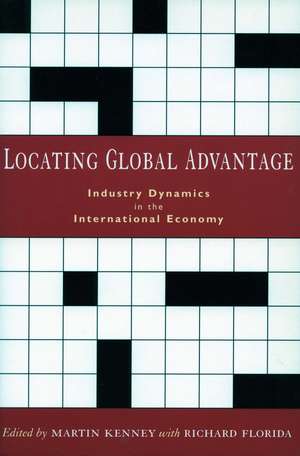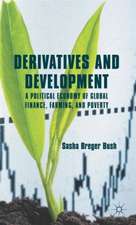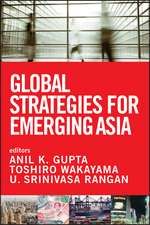Locating Global Advantage: Industry Dynamics in the International Economy: Innovation and Technology in the World E
Editat de Martin Kenney, Richard Floridaen Limba Engleză Paperback – 17 noi 2003
What are the forces that are driving firms and industries to globalize their operations? This volume explores how specific industries have organized their global operations through case studies of seven manufacturing industries: garments and textiles, automobiles and auto parts, televisions, hard disk drives, flat panel displays, semiconductors, and personal computers. Based on long-term research sponsored by the Sloan Foundation, the chapters provide readers with a nuanced understanding of the complex matrix of factor costs, access to inimitable capabilities, and time-based pressures that influence where firms decide to locate particular segments of the value chain.
The book examines globalization within the context of five factors affecting locational decisions: advances in transportation and communication; the clustering of knowledge assets; the drive to reduce cycle times; the commodification of existing products; and the relative advantages of proximity to customers. The case studies are framed by Paul Deguid’s Preface on the significance of power in value chains and Bruce Kogut’s conclusion on the importance of knowledge in locational decisions. Together, the chapters reveal a remarkable diversity of responses across industries to these forces, and suggest that any understanding of globalization must appreciate this diversity.
This volume is ideal for both MBA and undergraduate students studying the location of economic activities by multinational firms.
The book examines globalization within the context of five factors affecting locational decisions: advances in transportation and communication; the clustering of knowledge assets; the drive to reduce cycle times; the commodification of existing products; and the relative advantages of proximity to customers. The case studies are framed by Paul Deguid’s Preface on the significance of power in value chains and Bruce Kogut’s conclusion on the importance of knowledge in locational decisions. Together, the chapters reveal a remarkable diversity of responses across industries to these forces, and suggest that any understanding of globalization must appreciate this diversity.
This volume is ideal for both MBA and undergraduate students studying the location of economic activities by multinational firms.
| Toate formatele și edițiile | Preț | Express |
|---|---|---|
| Paperback (1) | 265.13 lei 3-5 săpt. | |
| Stanford University Press – 17 noi 2003 | 265.13 lei 3-5 săpt. | |
| Hardback (1) | 887.37 lei 6-8 săpt. | |
| Stanford University Press – 24 noi 2003 | 887.37 lei 6-8 săpt. |
Preț: 265.13 lei
Nou
Puncte Express: 398
Preț estimativ în valută:
50.73€ • 52.97$ • 41.89£
50.73€ • 52.97$ • 41.89£
Carte disponibilă
Livrare economică 25 martie-08 aprilie
Preluare comenzi: 021 569.72.76
Specificații
ISBN-13: 9780804747585
ISBN-10: 080474758X
Pagini: 304
Dimensiuni: 152 x 229 x 23 mm
Greutate: 0.49 kg
Ediția:1
Editura: Stanford University Press
Colecția Stanford Business Books
Seria Innovation and Technology in the World E
ISBN-10: 080474758X
Pagini: 304
Dimensiuni: 152 x 229 x 23 mm
Greutate: 0.49 kg
Ediția:1
Editura: Stanford University Press
Colecția Stanford Business Books
Seria Innovation and Technology in the World E
Notă biografică
Martin Kenney is Professor of Human and Community Development at the University of California, Davis. Richard Florida is Heinz Professor of Regional Economic Development at Carnegie Mellon University.
Descriere
This volume explores how industries organize their global operations, through case studies of seven manufacturing industries. The chapters provide a nuanced understanding of the complex matrix of factor costs, access to inimitable capabilities, and time-based pressures that influence where firms decide to locate particular segments of the value chain.

































